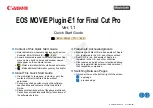
1142
ExtremeWare Software 7.3.0 Command Reference Guide
IP Unicast Commands
A static route must be associated with a valid IP subnet. An IP subnet is associated with a single VLAN
by its IP address and subnet mask. If the VLAN is subsequently deleted, the static route entries using
that subnet must be deleted manually.
When there are multiple, conflicting choices of a route to a particular destination, the router picks the
route with the longest matching network mask. If these are still equal, the router picks the route using
the following criteria (in the order specified):
•
Directly attached network interfaces
•
ICMP redirects
•
Static routes
•
Directly attached network interfaces that are not active
If you define multiple default routes, the route that has the lowest metric is used. If there are multiple
default routes that have the same lowest metric, the system picks one of the routes.
You can also configure
blackhole
routes—traffic to these destinations is silently dropped.
Internet Control Message Protocol (ICMP) is used to transmit information needed to control IP traffic. It
is used mainly to provide information about routes to destination addresses. ICMP redirect messages
inform hosts about more accurate routes to other systems, whereas ICMP unreachable messages indicate
problems with a route.
Additionally, ICMP can cause TCP connection to terminate gracefully if the route becomes unavailable.
After IP unicast routing has been configured, you can configure the switch to forward Dynamic Host
Configuration Protocol (DHCP) or BOOTP requests coming from clients on subnets being service by the
switch and going to hosts on different subnets. This feature can be used in various applications,
including DHCP services between Windows NT servers and clients running Windows 95.
UDP-forwarding is a flexible and generalized routing utility for handling the directed forwarding of
broadcast UDP packets. UDP-forwarding allows applications, such as multiple DHCP relay services
from differing sets of VLANs, to be directed to different DHCP servers. The following rules apply to
UDP broadcast packets handled by this feature:
•
If the UDP profile includes BOOTP or DHCP, the packet is handled according to guidelines in RFC
1542.
•
If the UDP profile includes other types of traffic, these packets have the IP destination address
modified as configured, and changes are made to the IP and UDP checksums and decrements to the
TTL field, as appropriate.
If the UDP-forwarding is used for BOOTP or DHCP forwarding purposes, do not configure or use the
existing
bootprelay
function. However, if the previous
bootprelay
functions are adequate, you can
continue to use them.
To configure UPD-forwarding, you must first create a UDP-forward destination profile. The profile
describes the types of UDP packets (by port number) that are used and where they are to be forwarded.
You must give the profile a unique name, in the same manner as a VLAN, protocol filter, or Spanning
Tree Domain (STD).
Next, configure a VLAN to make use of the UDP-forwarding profile. As a result, all incoming traffic
from the VLAN that matches the UDP profile is handled as specified in the UDP-forwarding profile.
A maximum of 10 UDP-forwarding profiles can be defined. Each named profile may contain a
maximum of eight “rules” defining the UDP port, and destination IP address or VLAN. A VLAN can
Summary of Contents for ExtremeWare 7.3.0
Page 54: ...54 ExtremeWare Software 7 3 0 Command Reference Guide Contents...
Page 104: ...104 ExtremeWare Software 7 3 0 Command Reference Guide Commands for Accessing the Switch...
Page 378: ...378 ExtremeWare Software 7 3 0 Command Reference Guide FDB Commands...
Page 418: ...418 ExtremeWare Software 7 3 0 Command Reference Guide QoS Commands...
Page 436: ...436 ExtremeWare Software 7 3 0 Command Reference Guide NAT Commands...
Page 600: ...600 ExtremeWare Software 7 3 0 Command Reference Guide SLB Commands...
Page 968: ...968 ExtremeWare Software 7 3 0 Command Reference Guide Security Commands...
Page 1002: ...1002 ExtremeWare Software 7 3 0 Command Reference Guide EAPS Commands...
Page 1126: ...1126 ExtremeWare Software 7 3 0 Command Reference Guide ESRP Commands...
Page 1392: ...1392 ExtremeWare Software 7 3 0 Command Reference Guide IGP Commands...
Page 1478: ...1478 ExtremeWare Software 7 3 0 Command Reference Guide BGP Commands...
Page 1556: ...1556 ExtremeWare Software 7 3 0 Command Reference Guide IP Multicast Commands...
Page 1600: ...1600 ExtremeWare Software 7 3 0 Command Reference Guide IPX Commands...
Page 1616: ...1616 ExtremeWare Software 7 3 0 Command Reference Guide ARM Commands...
Page 1694: ...1694 ExtremeWare Software 7 3 0 Command Reference Guide PoS Commands...
Page 1750: ...1750 ExtremeWare Software 7 3 0 Command Reference Guide T1 E1 and T3 WAN Commands...
Page 1856: ...1856 ExtremeWare Software 7 3 0 Command Reference Guide MPLS Commands...
Page 1898: ...1898 ExtremeWare Software 7 3 0 Command Reference Guide High Density Gigabit Ethernet Commands...
Page 1938: ...1938 ExtremeWare Software 7 3 0 Command Reference Guide Power Over Ethernet Commands...
Page 1988: ...1988 ExtremeWare Software 7 3 0 Command Reference Guide H VPLS Commands...
Page 2106: ...2106 ExtremeWare Software 7 3 0 Command Reference Guide Wireless Commands...
Page 2132: ...2132 ExtremeWare Software 7 3 0 Command Reference Guide Configuration and Image Commands...
Page 2236: ...2236 ExtremeWare Software 7 3 0 Command Reference Guide Troubleshooting Commands...
Page 2254: ...2254 ExtremeWare Software 7 3 0 Command Reference Guide Index of Commands...
















































